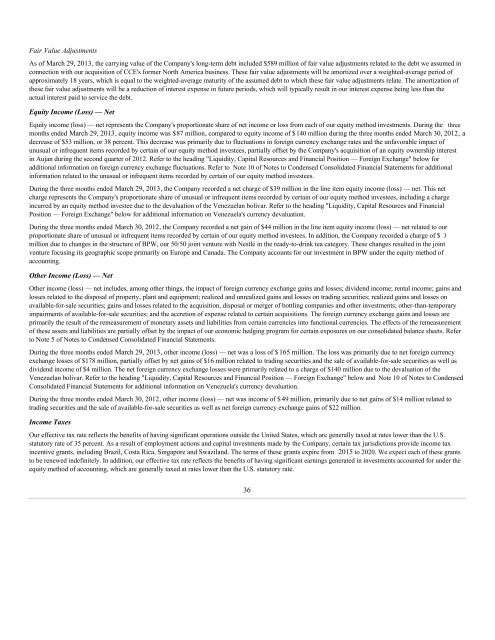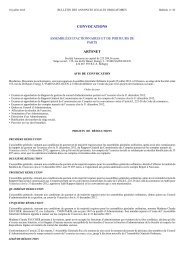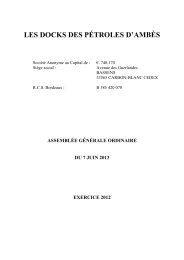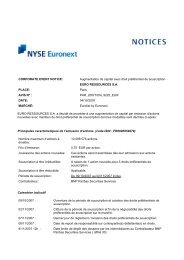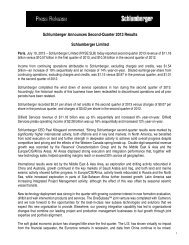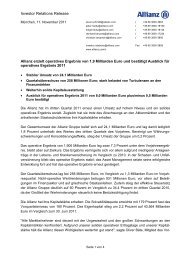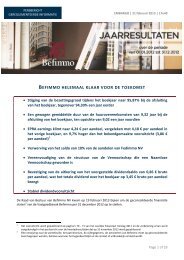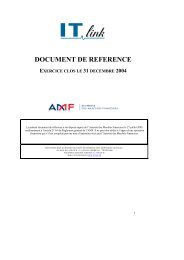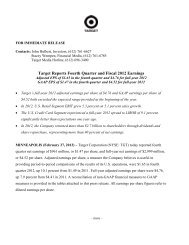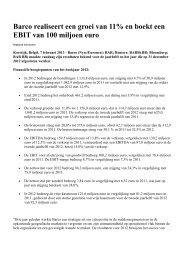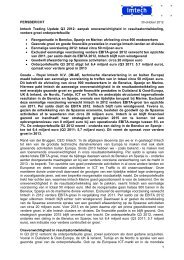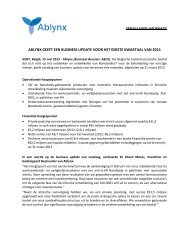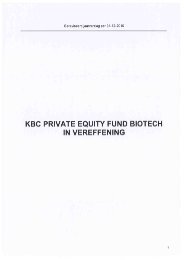FORM 10-Q
FORM 10-Q
FORM 10-Q
Create successful ePaper yourself
Turn your PDF publications into a flip-book with our unique Google optimized e-Paper software.
Fair Value Adjustments<br />
As of March 29, 2013, the carrying value of the Company's long-term debt included $589 million of fair value adjustments related to the debt we assumed in<br />
connection with our acquisition of CCE's former North America business. These fair value adjustments will be amortized over a weighted-average period of<br />
approximately 18 years, which is equal to the weighted-average maturity of the assumed debt to which these fair value adjustments relate. The amortization of<br />
these fair value adjustments will be a reduction of interest expense in future periods, which will typically result in our interest expense being less than the<br />
actual interest paid to service the debt.<br />
Equity Income (Loss) — Net<br />
Equity income (loss) — net represents the Company's proportionate share of net income or loss from each of our equity method investments. During the three<br />
months ended March 29, 2013, equity income was $87 million, compared to equity income of $140 million during the three months ended March 30, 2012, a<br />
decrease of $53 million, or 38 percent. This decrease was primarily due to fluctuations in foreign currency exchange rates and the unfavorable impact of<br />
unusual or infrequent items recorded by certain of our equity method investees, partially offset by the Company's acquisition of an equity ownership interest<br />
in Aujan during the second quarter of 2012. Refer to the heading "Liquidity, Capital Resources and Financial Position — Foreign Exchange" below for<br />
additional information on foreign currency exchange fluctuations. Refer to Note <strong>10</strong> of Notes to Condensed Consolidated Financial Statements for additional<br />
information related to the unusual or infrequent items recorded by certain of our equity method investees.<br />
During the three months ended March 29, 2013, the Company recorded a net charge of $39 million in the line item equity income (loss) — net. This net<br />
charge represents the Company's proportionate share of unusual or infrequent items recorded by certain of our equity method investees, including a charge<br />
incurred by an equity method investee due to the devaluation of the Venezuelan bolivar. Refer to the heading "Liquidity, Capital Resources and Financial<br />
Position — Foreign Exchange" below for additional information on Venezuela's currency devaluation.<br />
During the three months ended March 30, 2012, the Company recorded a net gain of $44 million in the line item equity income (loss) — net related to our<br />
proportionate share of unusual or infrequent items recorded by certain of our equity method investees. In addition, the Company recorded a charge of $ 3<br />
million due to changes in the structure of BPW, our 50/50 joint venture with Nestlé in the ready-to-drink tea category. These changes resulted in the joint<br />
venture focusing its geographic scope primarily on Europe and Canada. The Company accounts for our investment in BPW under the equity method of<br />
accounting.<br />
Other Income (Loss) — Net<br />
Other income (loss) — net includes, among other things, the impact of foreign currency exchange gains and losses; dividend income; rental income; gains and<br />
losses related to the disposal of property, plant and equipment; realized and unrealized gains and losses on trading securities; realized gains and losses on<br />
available-for-sale securities; gains and losses related to the acquisition, disposal or merger of bottling companies and other investments; other-than-temporary<br />
impairments of available-for-sale securities; and the accretion of expense related to certain acquisitions. The foreign currency exchange gains and losses are<br />
primarily the result of the remeasurement of monetary assets and liabilities from certain currencies into functional currencies. The effects of the remeasurement<br />
of these assets and liabilities are partially offset by the impact of our economic hedging program for certain exposures on our consolidated balance sheets. Refer<br />
to Note 5 of Notes to Condensed Consolidated Financial Statements.<br />
During the three months ended March 29, 2013, other income (loss) — net was a loss of $ 165 million. The loss was primarily due to net foreign currency<br />
exchange losses of $178 million, partially offset by net gains of $16 million related to trading securities and the sale of available-for-sale securities as well as<br />
dividend income of $4 million. The net foreign currency exchange losses were primarily related to a charge of $140 million due to the devaluation of the<br />
Venezuelan bolivar. Refer to the heading "Liquidity, Capital Resources and Financial Position — Foreign Exchange" below and Note <strong>10</strong> of Notes to Condensed<br />
Consolidated Financial Statements for additional information on Venezuela's currency devaluation.<br />
During the three months ended March 30, 2012, other income (loss) — net was income of $ 49 million, primarily due to net gains of $14 million related to<br />
trading securities and the sale of available-for-sale securities as well as net foreign currency exchange gains of $22 million.<br />
Income Taxes<br />
Our effective tax rate reflects the benefits of having significant operations outside the United States, which are generally taxed at rates lower than the U.S.<br />
statutory rate of 35 percent. As a result of employment actions and capital investments made by the Company, certain tax jurisdictions provide income tax<br />
incentive grants, including Brazil, Costa Rica, Singapore and Swaziland. The terms of these grants expire from 2015 to 2020. We expect each of these grants<br />
to be renewed indefinitely. In addition, our effective tax rate reflects the benefits of having significant earnings generated in investments accounted for under the<br />
equity method of accounting, which are generally taxed at rates lower than the U.S. statutory rate.<br />
36


